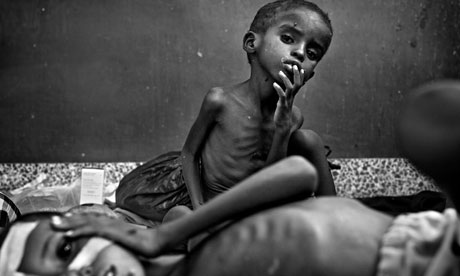Driven from their farms by drought, starving Somali families are forced to travel to the wartorn capital in search of food
East Africa drought - in pictures
East Africa drought - in pictures
- guardian.co.uk,
- Article history

Having lost all her cattle to the drought and one child, Raha Abdi Nor brought her surviving children to Banadir Hospital in Mogadishu where they are being treated for severe malnutrition. Photograph: Robin Hammond
As the grasslands surrounding Mogadishu turned to dust, the bombed out shells of once bustling shops in the Somalian capital became home for farming families and their few surviving animals. As the wind swept away the last of the grass, and with it any hopes the land could continue to sustain the people and cattle that relied on it for survival. With no other option, thousands of families walked with their remaining herds to Somalia's war-torn capital.
Many have settled with their emaciated children and animals across the road from Bakara market – the frontline of the war against the Islamist group al-Shabaab. The crack of AK-47 gunfire and the whizzing of bullets overhead underlines their desperation. The gunfire does not startle the new inhabitants in their twig and cloth tents as they have become accustomed to the near constant rattle of war. Along the street cows are dragging at the branches of Mogadishu's trees. There is no pasture left for the starving animals. so the leaves of the city's trees must suffice.
These families consider themselves lucky. On the other side of the city in Medina hospital are those who don't have any animals left. Five-year-old Akhmad has strength enough to sit up, his seven-year-old brother Mahat lies semi-conscious on the hospital floor in front of him, a feeding tube taped to his face.
Their mother Raha Abdi Nor sits clutching a sleeping 10-month-old baby, rocking back and forward. The family walked to Mogadishu when the last of their cattle starved to death. Five of them started the journey, but the exertion of the walk drained Raha's three-year-old son of the last of his strength. They buried him on the way.
In Old Mogadishu through alleyways you'd expect to find in Naples or Rome, a feeding centre is crowded with mothers clutching malnourished babies and tags with numbers. They wait to be called so their child can be weighed and offered food.
They cannot expect much, however. The queue moves slowly. The international aid agencies that usually feed famine victims have pretty much abandoned Mogadishu – the Islamists that control large parts of the city, and indeed the country, have made it too dangerous to help.The number seven is called and a woman pushes her way forward, producing a stick-thin child from under her burka. The child is a seven-year-old who looks four.
Outside a man holds a barely conscious boy, in his hand a tag with the number 57. At this rate he will not be seen today. The boy's fate may be that of so many children caught between fighting and famine in Somalia – he may not survive to come back tomorrow.
No comments:
Post a Comment